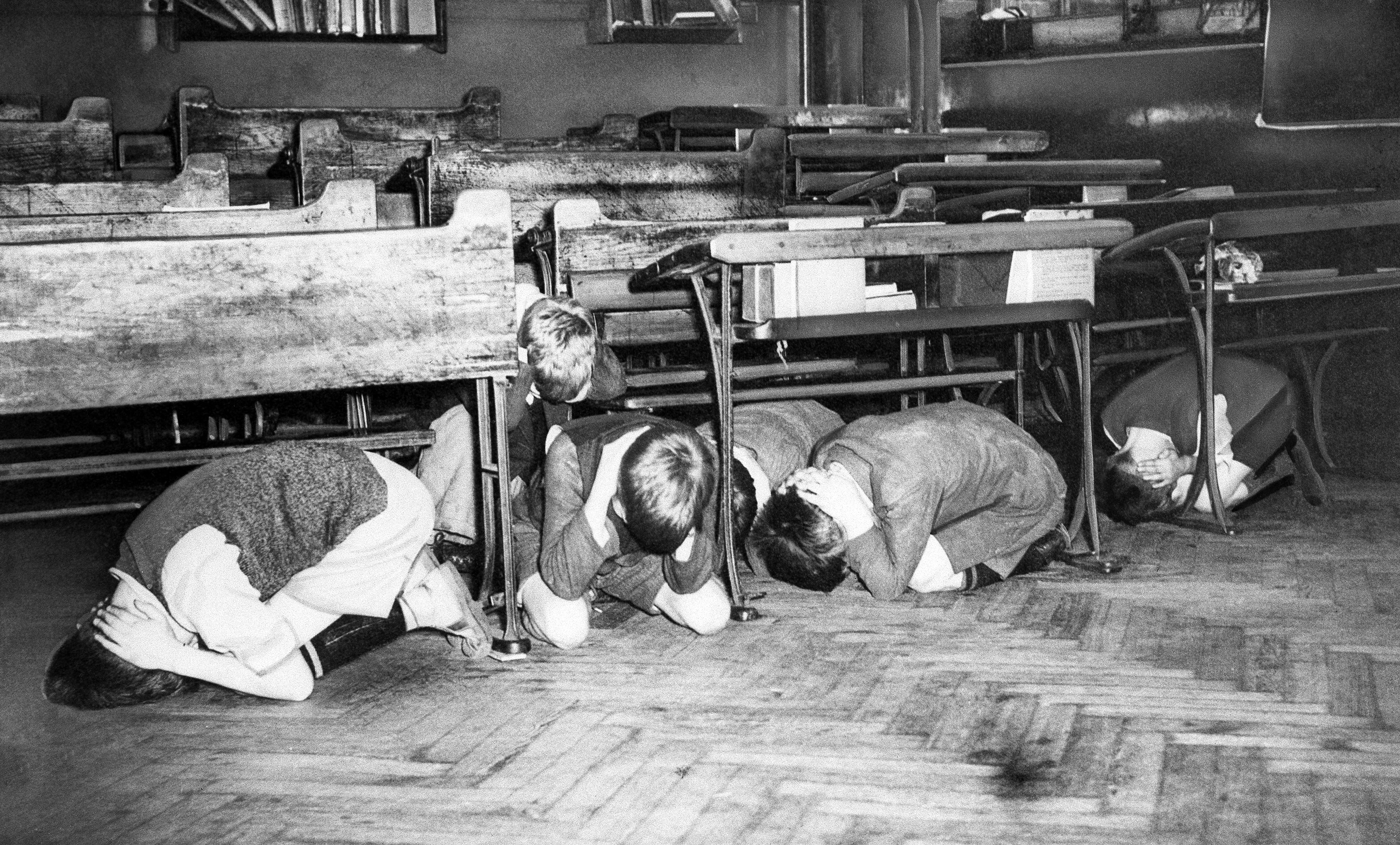Why do Democrats want another Cold War?
Nothing good will come of this


If hysterical Democrats are to be taken at their word as they caterwaul about Russia and President Trump, then it's clear they believe the time has come for another Cold War — or perhaps that we're in one already.
This is ludicrous. But before I proceed to explain why I do not think that deliberately provoking additional hostilities with the home of the world's largest nuclear arsenal is in the best interests of either the United States or the Russian Federation, it is worth taking a second look at the recent summit in Finland between Trump and Russia's Vladimir Putin.
The president's conduct has been casually called "treasonous" (including in a tweet by Barack Obama's former CIA director). If Trump did in fact commit treason, it would certainly be the case that he should be removed from office. But I think there is a better name for what he was up to: diplomacy.
The Week
Escape your echo chamber. Get the facts behind the news, plus analysis from multiple perspectives.

Sign up for The Week's Free Newsletters
From our morning news briefing to a weekly Good News Newsletter, get the best of The Week delivered directly to your inbox.
From our morning news briefing to a weekly Good News Newsletter, get the best of The Week delivered directly to your inbox.
Earlier this week I described Monday's summit as "repulsive" and "pointless." I stand by that assertion. But this description needs qualifying. The greatest mistake made by President Trump's critics has long been and continues to be their insistence upon treating his every word and action as though they were historically unprecedented outrages. For politicians this is understandable; even if they were not ignorant of history, as most of them certainly are, they could be counted upon to lie or ignore it to suit their purposes. For a journalist like CNN's Anderson Cooper (who immediately told viewers, "You have been watching perhaps one of the most disgraceful performances by an American president at a summit in front of a Russian leader that I've ever seen"), it is embarrassing.
How unprecedented and "disgraceful" was Trump's meeting with Putin? Consider the history of U.S.-Russian relations in the last half century or so.
In 1945, Franklin D. Roosevelt, the greatest president of modern times in the assessment of most historians (one with which I concur), sold Eastern Europe to Joseph Stalin. There is no eliding this fact. He condemned millions of people to a half century of penury and starvation. It is possible to acknowledge the hideousness of this reality while simultaneously believing that he had no other choice. It was the price of what would pass for European peace. Without Stalin's assistance, Adolf Hitler could not have been defeated. If Yalta did not quite evince the better angels of our nature, it at least confirmed the existence of the merely realistic ones.
Roosevelt was not, of course, the last American president to meet in person with the leaders of what Ronald Reagan would later call the "Evil Empire." Only a few months after Yalta, Harry Truman met with both Stalin and Winston Churchill to decide the fate of post-war Germany. The result of the Potsdam Conference was not only the partitioning of the former Nazi Reich into separate democratic and communist states but the end of America and Britain's recognition of the Polish government-in-exile. That Churchill's country had gone to war six years earlier specifically over the issue of Poland's territorial sovereignty, something Britain had been in no condition to guarantee, is one of the finest examples of tragic irony afforded to us by modern history.
A free daily email with the biggest news stories of the day – and the best features from TheWeek.com
Dwight Eisenhower met three times with Nikita Khrushchev, first in Geneva, where conservative and liberal critics alike accused him of embarrassing himself and the national honor by offering to open American airspace to Russian military planes in exchange for reciprocal privileges. John F. Kennedy was so candid that his Soviet counterpart decided that he could get away with putting nuclear weapons off the coast of Florida. In Glassboro, New Jersey, in 1967, Lyndon Johnson proposed to Alexei Kosygin that Vietnam could be split in two forever and even suggested that the Soviet Union oversee democratic elections in the South. En route to San Clemente, Richard Nixon allowed Leonid Brezhnev to show him his John Wayne impersonation; everyone aboard Air Force One hooted with laughter at this jolly moment with the leader of a sadistically repressive dictatorship. Jimmy Carter, not to be outdone, actually kissed Brezhnev in a gesture of Schillerian universal brotherhood. Ronald Reagan attempted to rid the world of nuclear weapons forever at Reykjavik and was second guessed in the conservative media for failing to see that the Soviet Union was still near the height of her terrible powers — until she collapsed a few years after he left office.
History leaves me comfortable with my initial criticism of the summit. Watching Trump whinge about his domestic opponents in front of a foreign leader was painful, like bringing up a family quarrel at a barbecue to which a much-loathed neighbor has been invited. It is always better to show a united front. And the whole business was a sham. Nothing of substance seems to have been discussed or even proposed. But this wasn't treason — it was stupidity.
Which brings us back to the question of why anyone thinks that belligerence is the best response to — what exactly? What is the source of Democrats' animus against Putin? Yes, his agents clumsily intruded into our last presidential election. Well, so what? Did the '80s call again and return our recently gifted foreign policy in near-mint condition? Is it somehow astonishing news that they have attempted to swing our elections just as we have done our best to alter the outcome of theirs ever since propping up Boris Yeltsin by any means necessary was the official policy of the Clinton State Department? Some point out that Putin is — get this — essentially anti-democratic and and that he has installed himself as a virtual dictator-for-life. And? If this were a literal deal-breaker we would have to change the terms of our relationships with many other countries, not least of them China. Others say that Russia has behaved aggressively toward our allies, but, again, this is just as true of Beijing.
It's all nonsense. The only good explanation for surging liberal hostility towards Russia is resentment. Hillary Clinton lost an election to perhaps the least attractive candidate ever fielded by a major political party despite having more resources, financial and otherwise, at her disposal, infinitely more personal experience with political campaigns, and the almost unanimous support of the media, political, and foreign policy establishment. Moreover, she lost without even bothering to campaign in the very states where her opponent obviously needed to secure victory.
Since the end of the Cold War no American president has gone out of his way to antagonize Russia; under Bill Clinton, George W. Bush, and Barack Obama there has been a steady process of winding things down, of seeing into souls, of hitting literal big red reset buttons — until President Trump, surrounded by the very hawks whom he allegedly blames for the disastrous decision to invade Iraq, decided to bomb Russian's Middle Eastern client Bashar al-Assad, expel dozens of Russian diplomats, ramp up sanctions (even if it was reluctantly), sell arms to Ukraine, demand an overnight increase in NATO spending, and post troops along the Polish border. If this is treason or collusion, I'd hate to see how hot a second Cold War gets.
Matthew Walther is a national correspondent at The Week. His work has also appeared in First Things, The Spectator of London, The Catholic Herald, National Review, and other publications. He is currently writing a biography of the Rev. Montague Summers. He is also a Robert Novak Journalism Fellow.
-
 Quiz of The Week: 3 – 9 January
Quiz of The Week: 3 – 9 JanuaryQuiz Have you been paying attention to The Week’s news?
-
 The Week Unwrapped: Is Elon Musk’s AI tool a platform for abuse?
The Week Unwrapped: Is Elon Musk’s AI tool a platform for abuse?Podcast Plus can Mumsnet predict who will be the next PM? And who is still watching Avatar sequels?
-
 The week’s best photos
The week’s best photosIn Pictures A fireman's ladder, a race through the desert, and more
-
 US nabs ‘shadow’ tanker claimed by Russia
US nabs ‘shadow’ tanker claimed by RussiaSpeed Read The ship was one of two vessels seized by the US military
-
 How Bulgaria’s government fell amid mass protests
How Bulgaria’s government fell amid mass protestsThe Explainer The country’s prime minister resigned as part of the fallout
-
 Femicide: Italy’s newest crime
Femicide: Italy’s newest crimeThe Explainer Landmark law to criminalise murder of a woman as an ‘act of hatred’ or ‘subjugation’ but critics say Italy is still deeply patriarchal
-
 Brazil’s Bolsonaro behind bars after appeals run out
Brazil’s Bolsonaro behind bars after appeals run outSpeed Read He will serve 27 years in prison
-
 Americans traveling abroad face renewed criticism in the Trump era
Americans traveling abroad face renewed criticism in the Trump eraThe Explainer Some of Trump’s behavior has Americans being questioned
-
 Nigeria confused by Trump invasion threat
Nigeria confused by Trump invasion threatSpeed Read Trump has claimed the country is persecuting Christians
-
 Sanae Takaichi: Japan’s Iron Lady set to be the country’s first woman prime minister
Sanae Takaichi: Japan’s Iron Lady set to be the country’s first woman prime ministerIn the Spotlight Takaichi is a member of Japan’s conservative, nationalist Liberal Democratic Party
-
 Russia is ‘helping China’ prepare for an invasion of Taiwan
Russia is ‘helping China’ prepare for an invasion of TaiwanIn the Spotlight Russia is reportedly allowing China access to military training
